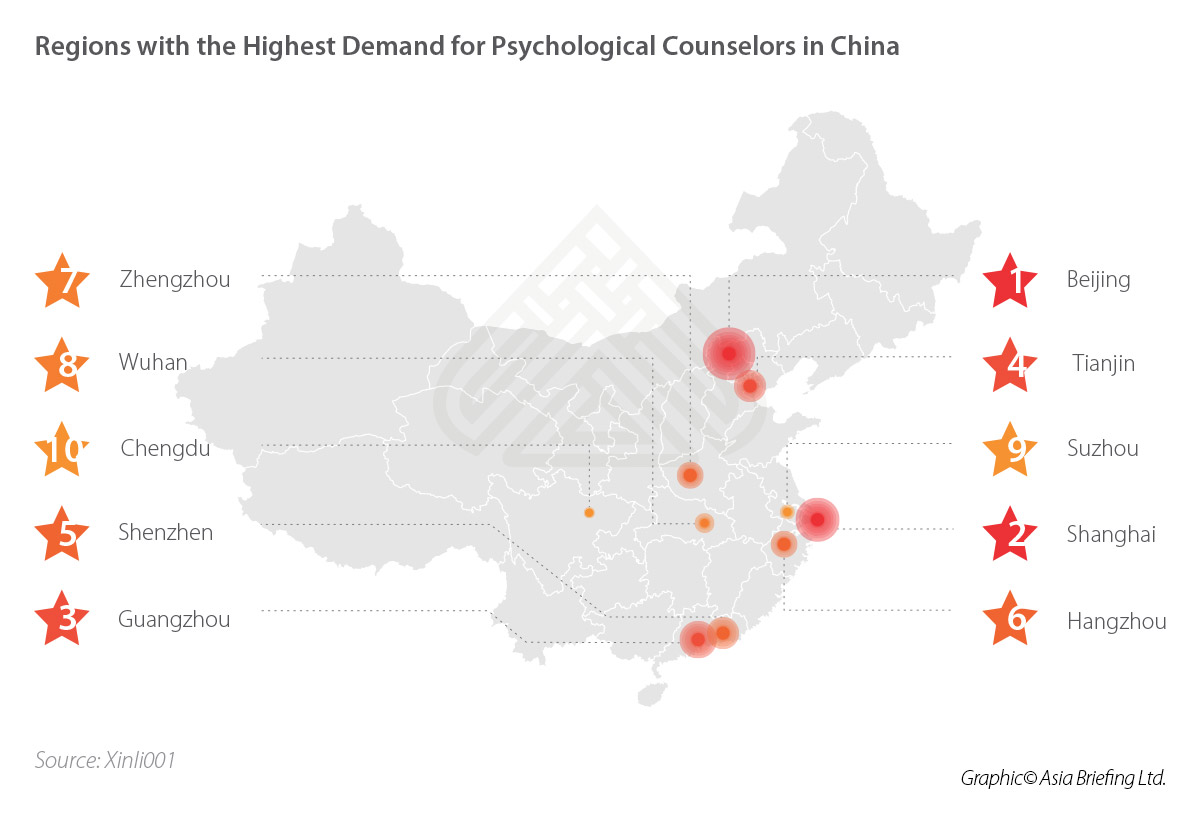The Mental Healthcare Industry in China
By I-Ting Shelly Lin
China is in the throes of a mental health crisis, with millions suffering from untreated mental illnesses and psychiatric disorders.
In 2017, 54 million Chinese suffered from depression, representing 4.2 percent of the country’s population, according to the World Health Organization (WHO).
Furthermore, in 2012, the renowned medical journal The Lancet reported that approximately 173 million Chinese were estimated to have diagnosable mental illnesses or psychiatric disorders. Of these, only 15 million sought treatment.
The number of people holding a national second- or third-level certificate in psychological counseling increased exponentially from 2009 to 2017, from 160,000 to an estimated 1 million. However, only 40,000 certificate holders provide psychological counseling on either a full- or part-time basis, according to a 2017 report from the China Higher Education Society.
This means more than 90 percent of licensed psychological counselors are not employed in the industry, despite projections that an additional 430,000 counselors will be needed to meet demand in the coming years.
Although there is growing demand for mental healthcare services, many Chinese are reluctant to admit that they have a mental illness or to seek professional help. This is largely due to fear of exposure, owing of the stigma associated with mental health disorders in the relatively conservative Chinese society.
Nevertheless, in an attempt to remedy these issues, the Chinese government has considerably increased investments in mental healthcare over the past decade. These efforts alone, however, have proven inadequate in addressing China’s vast mental health needs.
![]() RELATED: How to Invest in China’s Growing Education Subsectors
RELATED: How to Invest in China’s Growing Education Subsectors
Mental healthcare services in China
Mental health services in China can be separated into two categories.
In the first category are services for patients with severe conditions, who often need medical attention and medication prescribed by a psychiatrist. An example in this category would be the services provided by Wenzhou Kangning Hospital, China’s largest private mental health care hospital, which combines psychiatric treatments with psychological counseling.
In the second category are services that provide for those with relatively mild symptoms, who may require only psychological counseling. These services can be accessed in schools, corporations, communities, and private practices.
In China, counseling sessions are similar to coaching — patients tend to look for direct and immediate suggestions to help solve their mental health problems. A single one-on-one counseling session on average costs between RMB 300 (US$47) and RMB 700 (US$110), fees that are considered high by most people.
According to a joint report by jiandanxinli and Peking University on the domestic mental health care industry, 60 percent of people who receive counseling are between 25 and 35 years old, 50 percent are single, and over 70 percent are female.
Students and people working in information technology, telecommunications, electronics, and finance represent the largest demographics. The most-discussed topics across all ages are emotional problems, personal development, and romantic relationships.
Generally, people from regions with higher economic performance (higher GDP per capita and higher disposable income) and better living standards are more willing to seek help from psychological counselors. Institutional services are better developed in north and east China than in the southwest and northwest regions.
In addition to traditional services and institutions, more and more people choose to meet with their counselors by phone or video calls because of privacy concerns and for convenience. A number of internet platforms, such as jiandanxinli, which has over 100,000 registered users, allow mental health service providers, psychological counselors, and psychiatrists to connect with potential clients all over the world.
According to the jiandanxinli and Peking University report, by 2016 there were an estimated 700 physical psychological counseling institutions, a 50 percent increase over 2013, and 64 internet-based psychological counseling platforms, compared to only one in 2014.
![]() RELATED: Pharmaceuticals Distribution in China
RELATED: Pharmaceuticals Distribution in China
The framework for mental healthcare in China
China’s first mental health–related law, the Mental Health Law of the People’s Republic of China, has been effective since May 2013. The law, which was updated in June 2018, aims to promote the well-being of the public and protects the rights of patients.
The law clarifies that psychological counselors are not authorized to perform psychotherapy nor engage in the diagnosis or treatment of mental disorders. Psychological counselors should only perform counseling; psychotherapy and diagnosis/treatment of mental disorders are the responsibilities of psychological therapists and psychiatrists, respectively.
In support of the Mental Health Law of the People’s Republic of China, China’s National Planning Guideline for the Healthcare Service System (2015–2020) contains key measures for mental health services. This includes the promotion of the treatment and care of patients with serious mental disorders, improvement of mental health services and systems, and the dissemination of mental health education. One of the main objectives of this planning document is to achieve the licensing of the needed 40,000 psychiatrists (and assistant psychiatrists) by 2020.
There have been other recent advances, both nationally and regionally: in late 2016, the government consolidated previous efforts and published guidelines to further promote mental health services in China. Also, 34 communities in Beijing’s Haidian District now include psychological counseling in the medical insurance system.
Providing psychological counseling services in China
The Chinese government has established regulations regarding an institution’s eligibility to provide psychological counseling services, though many of these rules vary depending on the region.
The vast majority of jurisdictions require psychological counselors to practice in registered institutions. Institutions that are not registered under the Administration for Industry and Commerce or the Administration of Civil Affairs are not permitted to offer counseling services.
For example, in both Beijing and Shanghai, profit-seeking psychological counseling institutions must apply to the Administration for Industry and Commerce for registration and obtain a business license. Not-for-profit institutions must apply to the Department of Civil Affairs for registration and must obtain a certificate of registration as a private non-enterprise unit.
In Beijing, psychological counseling practitioners must be employed by registered institutions and conform to one of the following conditions: (1) professionally certified based on education in psychology; (2) certified for the national qualification in psychological counseling; or (3) qualified as a practicing doctor of psychiatry.
These registration requirements may impact the legitimacy and viability of platforms like jiandanxinli because they might not be considered formal institutions by the government. The operation of the platform itself does not violate the law, but some analysts believe that internet platforms are technically not counseling institutions. Psychological counselors employed by such platforms may therefore be working illegally.
Likewise, the regulatory framework for foreign investment in psychological counseling services is unclear. Foreign investment in medical institutions is limited to joint ventures, but it is not clearly stated whether psychological counseling institutions fall under that category. Investors are thus recommended to confirm the details with local Administration for Industry and Commerce.
![]() Pre-Investment, Market Entry Strategy Advisory Services from Dezan Shira & Associates
Pre-Investment, Market Entry Strategy Advisory Services from Dezan Shira & Associates
Overcoming challenges
Major challenges in China’s mental health care industry include the social stigma of mental illness and the government’s passiveness in developing the industry.
Other problems are the number of professionals employed in this industry being far too low for the demand and the inconsistent level of performance of mental health service providers. The latter is due to the fact that the threshold for obtaining a national certificate is too low and that the professional training system is still somewhat disorganized.
In addition, analysts predict that China’s mental healthcare industry will continue to grow at a slow pace in the future because of the high costs of counseling services and treatment not being covered by health insurance. Some mental healthcare providers are working with private insurers to create special insurance that covers the cost of psychological counseling.
In the face of a variety of obstacles, the mental healthcare industry in China is growing relatively slowly. Yet, tens of millions of Chinese remain in desperate need of mental health services. To reconcile this contradiction, healthcare providers must come up with innovative solutions to meet the unique needs of the Chinese market.
About Us
China Briefing is published by Asia Briefing, a subsidiary of Dezan Shira & Associates. We produce material for foreign investors throughout Asia, including ASEAN, India, Indonesia, Russia, the Silk Road, and Vietnam. For editorial matters please contact us here, and for a complimentary subscription to our products, please click here.
Dezan Shira & Associates is a full service practice in China, providing business intelligence, due diligence, legal, tax, accounting, IT, HR, payroll, and advisory services throughout the China and Asian region. For assistance with China business issues or investments into China, please contact us at china@dezshira.com or visit us at www.dezshira.com
- Previous Article Increasing China-Russia Trade, Investment Opportunities as EAEU FTA Kicks In
- Next Article How to Transfer a Work Permit to a New Employer in China







